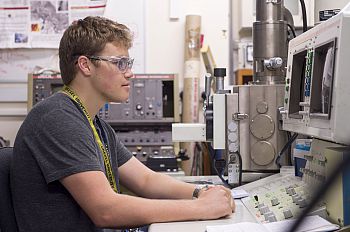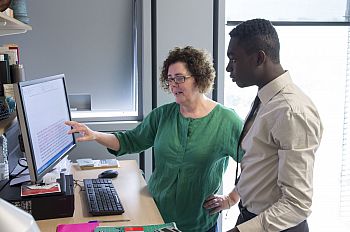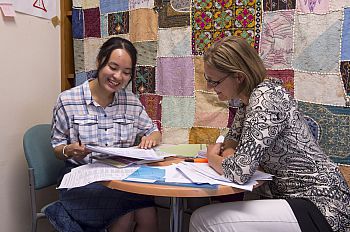International Junior Research Associate (IJRA) scheme
If you're joining us this summer as an International Junior Research Associate, welcome!
We can't wait to meet you, but right now, you've probably got a few questions. If there's anything you feel we've forgotten, or if you still have questions, drop us an email - we'll get back to you as soon as we can.
- What is the International Junior Research Associate (IJRA) scheme?
-
Sussex is passionate about undergraduate research. For the past ten years, we've developed the Junior Research Associate (JRA) scheme - a successful and competitive program that helps to prep our top undergraduates for a career in research. In 2014, we expanded this scheme to include high achieving international students from Sussex’s partner universities. These international JRAs (IJRAs) are given the chance to undertake an eight week research project over the summer, supervised by a leading member of Sussex faculty.
Primarily for students who are considering pursuing a career in research, the IJRA scheme is designed to immerse its participants in the Sussex research community and to give them real research experience, enabling each student to build important relationships with other ambitious undergraduates.
The scheme is open to students from selected institutional partners that share common research or teaching aims, such as the Chinese University of Hong Kong, Mahidol University, Tomsk State University, the University of Ghana and the University of California Santa Cruz.
Please note: unfortunately we're unable to accept applications from students directly.
Each year we will support around 20 IJRAs and this support includes:
- Waiving the programme fee
- Providing on-campus accommodation
- Covering the costs of some International Summer School social programme activities
- Providing orientation and appropriate workshops to support research skills
- Providing a certificate to each International JRA student upon completion of the scheme.

- What can I expect from the IJRA experience?
-
As an IJRA, you will undertake an intensive 8 week research project. You will be expected to make a time commitment equivalent to a normal University working week (36.5 hours), although it is recognised, as in all research, that flexibility will be required in the context of specific projects.
The structure of your project and how you conduct your research will depend on the project itself and your supervisor will be able to guide you.
For example, projects in social sciences or humanities are likely to be more literature based and require independent research, therefore approximately 95% of their time may be spent on desk research, and 5% progress review meetings and discussions with supervisor.
Whereas projects in sciences may require more time in the lab working with a research group, whereby their time may be spent approximately 70-90% independently working in the lab and between 10-30% in meetings, conducting fieldwork, or literature review or report writing.
As part of the IJRA scheme, you will have access to the Sussex Research HIVE in the library, a designated area for doctoral researchers and research staff.

- What is the research culture like?
-
Be aware that the UK has quite a distinctive research culture. With just 4% of the world’s researchers, the UK produces 16% of the world’s most highly-cited articles, we take research seriously, and there is a strong emphasis on carrying out research in the correct way. For example, we ensure that our research can be repeated and tested by others (research integrity), and we insist that the rights and dignity of the individuals or groups being researched are respected (research ethics).
While academic cultures will vary according to the subject and the level of study, there are some general trends that you may notice. For example:
- You may often work independently, studying on your own for significant periods of time
- You are expected to develop critical judgment, which means an ability to assess whether an argument is coherent and well-supported by evidence
- Learning factual data is important, but in higher level courses a critical approach is considered key to mastering the subject.
A sometimes surprising element of the UK's research culture is the expectation that students engaging in research will be critical and willing to discuss and even challenge the Faculty about their ideas and approaches.
We hope that, during your time as an IJRA, you feel confident enough to engage in critical discussions and debates with the academics you meet here.
- How will I be supported as a IJRA?
-
Your research supervisor will be your main point of contact and will provide support for academic queries and guidance for your overall research project. You may also be assigned an additional mentor or supervisor to support you in your day-to-day research. It is important to try to develop a strong relationship with your supervisor - for many IJRAs, this relationship is one of the most rewarding parts of their experience.
We encourage you to make contact with your supervisor before arriving at Sussex, to ask any questions about the project, and to enquire if there is any material they may suggest or provide you with to prepare you for undertaking your research. Once here, you should arrange to meet your supervisor during your first week. This will allow you to discuss the research project, ask how they wish you to undertake the research and to establish how frequently you will meet.
For any non-academic queries, such as culture shock, personal support or health issues etc., the University has many services available to support you - we have listed them on our IJRA info pack page. Alternatively, the IJRA scheme coordinators are here to support you and will be able to talk to you personally or provide guidance about the most appropriate support. You can contact the Undergraduate Research team undergraduate-research@sussex.ac.uk any time - we'll get back to you as soon as we can.

- What do I do now?
-
Coming to the UK to undertake an IJRA can be a big step, and we want you to feel prepared.
Check out our one-stop IJRA info pack page - it's full of useful links and information to help you make the most of your time in the UK. It'll tell you what you need to do before you leave home, what to pack, what to do when you arrive as well as much more.


